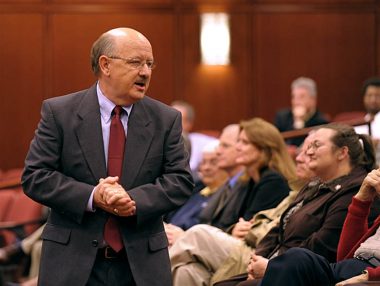Is the research a professor conducts “selfish” since it takes away his or her time from students? Or is it “selfless,” a way for faculty to better themselves in the classroom? Earl Honeycutt, the 2008-2009 Distinguished Scholar at Elon, takes the latter view and shared his views April 6 in an annual program for recipients of the award.

Why is faculty scholarship important? According to Honeycutt, there are several reasons.
Research keeps professors current in their fields, and as the quality of students at a university improves, so must its faculty. “As students improve, faculty has to also improve,” he said. “Some of the students are smarter than me!”
What’s more, he said, is that research demonstrates to prospective faculty candidates that a university encourages their own intellectual growth. Research also allows professors to conceptualize “real world” problems, to generate and test hypotheses with relevant data and methods, and to give students a valid education in a changing world.
“Research is a process. It helps us develop knowledge. Teaching is also a process, where we take that knowledge, and we help our students understand,” Honeycutt said. “In my opinion, they go hand in hand. It’s hard to be good teacher if you’re not acquiring new knowledge.”
Honeycutt made his presentation to several dozen faculty colleagues and students in the LaRose Digital Theatre. Family was also in attendance. His remarks were preceded by a moment of silence for Eugene Gooch, a professor of chemistry killed April 3 when he was struck by a car on University Drive while riding his bike.
“We have to be scholars because the world is changing really fast. We have to be ready and we have to prepare our students for that world,” Honeycutt said. “Because that’s really what it’s all about.”
Honeycutt is the ninth recipient of the award, established in 2000 to recognize a faculty member whose research has earned peer commendation and respect and who has made significant contribution to his or her field of study. Dozens of his articles have appeared in some of the top journals in his field, and he has co-authored four books in the past eight years.
Honeycutt received the Innovative Sales Educator Award from the United Sales Center Alliance in 2007; the Marvin Jolson 2005 Award for Best Contribution to Selling and Sales Management Practice; and the Love School of Business Dean’s Intellectual Contribution Award in 2004, among other honors.
Honeycutt also served on the Presidential Task Force on Scholarship at Elon in 2007 and, since 2006, has been a member of the Promotion and Tenure Committee.
A retired officer from the U.S. Air Force Reserve, Honeycutt earned his doctoral degree in business administration in 1986 from the University of Georgia. He joined the Elon faculty in 2002 having taught the previous two decades at Old Dominion University, UNC-Wilmington and his PhD alma mater.
“It would be difficult for me to exaggerate the positive influence he’s had on research and productivity here in the Love School of Business,” said Sharon Hodge, an associate professor of marketing who introduced Honeycutt. “He’s a superb mentor in terms of helping faculty improve the quality and quantity of their research.
“I don’t think I can count the number of times I’ve heard him offer to help other people, whether with idea generation or theory building or critical review or even proofreading somebody’s paper, without having any expectations about having his name added to that paper or hoping to have credit in return.”


